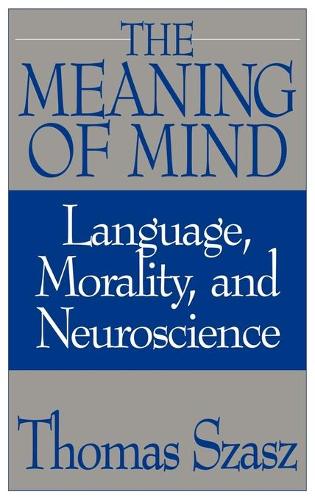
The Meaning of Mind: Language, Morality, and Neuroscience
(Hardback)
Publishing Details
The Meaning of Mind: Language, Morality, and Neuroscience
By (Author) Thomas Szasz
Bloomsbury Publishing PLC
Praeger Publishers Inc
30th September 1996
United States
Classifications
Tertiary Education
Non Fiction
Philosophy of mind
Cognition and cognitive psychology
Physiological psychology, neuropsychology, biopsychology
128.2
Physical Properties
Hardback
200
Width 156mm, Height 235mm
510g
Description
This work should be of interest to the general reader - as well as to the specialist in neuroscience, philosophy, law and the mental health professions - for at least two reasons: 1, because it offers a systematic exposition of mind-as-minding and of minding-as-inner dialogue or self-conversation; and 2, because it presents a carefully documented critique of the currently fashionable (and ostensibly scientific) equation of brain and mind. Here is Szasz's original presentation of the dialogue within (self-conversation) as the foundation for our understanding of "the mind", that is, what we mean when we use words such as "mind" and "mental" (as opposed to the word "brain"). Specifically, the book demonstrates that self-conversation is an ordinary, ubiquitous act; examines the phenomena of assuming and rejecting responsibility for one's inner voice; and analyses so-called abnormal mental states as the unacknowledged manifestations and/or consequences of self-conversation. The major thesis of this book is that only as a verb does the word "mind" name something in the real world, namely, attending or heeding. Minding is the ability to pay attention and adapt to one's environment by using language to communicate with others and oneself. Viewing the "mind" as a potentially infinite variety of self-conversations is the key that unlocks many of the mysteries we associate with this concept. Modern neuroscience is a misdirected effort to explain "mind" in terms of brain functions. The claims and conclusions of the diverse academics and scientists who engage in this enterprise undermine the concepts of moral agency and personal responsibility. Szasz shows that the cognitive function of speech is to enable us to talk not only to others but to ourselves as well, in short, to be our own interlocutor; and that the view that mind is brain - embraced by both the scientific community and the popular press - is not an empirical finding but a rhetorical ruse concealing humanity's unceasing struggle to control (inculpate and exculpate) persons by controlling the vocabulary. The discourse of brain-mind, unlike the discourse of man as moral agent, protects people from the dilemmas intrinsic to holding themselves responsible for their own actions and holding others responsible for theirs. Because we live in an age blessed by the fruits of materialist science, reductionist ideas about the relationship between brain and mind are more popular today than ever.
Reviews
"Within the broad church of anti-psychiatry, Thomas Szasz has been foremost in challenging a narrowly biological conception of human nature. Provocative, thoughtful, and highly readable, The Meaning of Mind extends his arguments to the bleak reductionism implicit in modern neuroscience. This is a timely stand against what C.S. Lewis called the 'abolition of man.' Thomas Szasz is a true Socratic gadfly of our modern Athens."-K.W.M. Fulford Professor of Philosophy and Mental Health Universities of Oxford and Warwick
.,."this crisply written and hard-hitting book not only scans but exposes the shortcomings of much scientific discourse about mind, brains and responsibility."-Network
...this crisply written and hard-hitting book not only scans but exposes the shortcomings of much scientific discourse about mind, brains and responsibility.-Network
As in his earlier work, Szasz here excels in revealing the inherent inconsistencies and contradiction in the socio-medical practice of classifying some individuals as insane. His insistence that philosophers and psychiatrists ignore the whole person in discussions of moral responsibility and insanity at their peril should be heeded.-Dialogue: Canadian Philosophical Review, #2, Vol38
Szasz here addresses the concept of mind with his customary fervor. Clear, provocative, and based on broad reading and experience...the argument...concludes with the assertion of 'the conceptual primacy of the person as moral agent.' Szasz upholds this primacy against its reduction to the mind by psychiatry, to the soul by religion, or to the body by neuroscience....Recommended for academic libraries.-Library Journal
Szasz is an original thinker whose theories, though open to challenge, are daring and profound. His new book should appeal not only to those interested in mental illness but to anyone caught up in the ongoing debate about the origin and nature of mind.- Publishers Weekly
..."this crisply written and hard-hitting book not only scans but exposes the shortcomings of much scientific discourse about mind, brains and responsibility."-Network
"As in his earlier work, Szasz here excels in revealing the inherent inconsistencies and contradiction in the socio-medical practice of classifying some individuals as insane. His insistence that philosophers and psychiatrists ignore the whole person in discussions of moral responsibility and insanity at their peril should be heeded."-Dialogue: Canadian Philosophical Review, #2, Vol38
"Szasz is an original thinker whose theories, though open to challenge, are daring and profound. His new book should appeal not only to those interested in mental illness but to anyone caught up in the ongoing debate about the origin and nature of mind."- Publishers Weekly
"Szasz here addresses the concept of mind with his customary fervor. Clear, provocative, and based on broad reading and experience...the argument...concludes with the assertion of 'the conceptual primacy of the person as moral agent.' Szasz upholds this primacy against its reduction to the mind by psychiatry, to the soul by religion, or to the body by neuroscience....Recommended for academic libraries."-Library Journal
Author Bio
THOMAS SZASZ, Professor of Psychiatry Emeritus at the State University of New York Health Science Center in Syracuse, New York, is the author of 23 books, among them the classic, The Myth of Mental Illness (1961), and Our Right To Drugs (Praeger, 1991).
